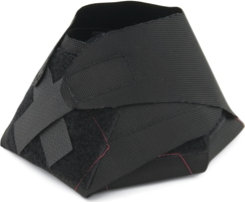David wrote "Hello, and THANK YOU! I really like your website, and along with others, learning more about horsemanship. What is your input on shod horse vs. barefoot horses? I see a lot of people going barefoot, and wonder if it would be better for the horse. I see proof of better circulation thru the legs as the hoof flexes with movement, as compared to shod and fixed, not able to flex...By the way, we have a mustang/quarter mare that does not like carrots! but a sucker for apples. She has a brand on the left side upper neck under the mane but I can't tell what it says. She is a sweetheart and good mama horse to her 6mo filly. daddy is tennessee walker, all bay and match. Thank you and please keep up good work. About Colic...if you know you going to ride all day, how much breakfast do you give the horse? and how long to wait till you ride? just a little soaked hay enuff? Man thanks fer puttin up with me...David"
As far as putting shoes on a horse, the type of riding and terrain, and even more so, the quality or soundness of the feet will determine that. In a mostly sand or dirt environment horses can go barefoot with no problem.
More than half of my horses are unshod. If you are going to be riding in rocky areas than shoes would make sense. A good farrier can correct some problems with the feet with corrective shoeing. One of my horse's had a pretty bad flare on his back right outside hoof, and in fact all his feet were in pretty bad shape when I picked him up. Consistent and good shoeing has given him the best feet he can hope for.
The hoof flexing or not flexing should have no effect on circulation, shod or unshod. I would think the concussion of the feet striking the ground and the contraction/extension of the muscles having more to do with circulation. But you know God made those horses without shoes and I think if you can get away without putting shoes on then, for the most part, your horse will be better for it. You can always carry hoof wraps or boots in your saddle bags if you think you might get into some rocky ground.
I think it's pretty unusual for a horse not to like carrots. I have a Mustang who won't eat apples for some reason. When I got him, he didn't eat grain either, but now he like's it well enough.
You may be able to figure out your Mustang brand by going to this web site - Mustangs4us. I'm interested in hearing how your Mustang - Tennessee Walker foal works out. That's an interesting cross. I had a Walker-Quarter Horse cross one time and he was a dandy - very willing to learn and please.
If I'm riding long and far I always let my horses eat and get a drink before hand. I think it's good to have some feed in the gut for energy and to keep the gut moving. If I'm short of time and I'm trailering someplace I may just feed them 5 or 6 lbs of alfalfa, and their grain, then hang a hay net of wet Coastal Bermuda in the trailer for them. More than once I got called out to find a missing person and had to leave pronto so I let my horse eat wet alfalfa from a large bucket, while I was tacking him up. I think feeding amount and time between feeding and riding will also depend upon how hard you are going to work them.
There are many cases of narcotics traffickers using horses to pack dope across the border. It is not unusual for some of these strings to go without feed and water in some cases for a couple days. The trafficker's obviously don't care about the horses and always turn them loose after reaching the vehicle load up spot. I think if I caught someone doing this, I rope them and drag them a long piece. Probably couldn't hang them, which would be my first choice, because of a lack of suitable trees.
I know Cowboys and recreational riders who absolutely will not let their horse graze while they are in the saddle. They call it a bad habit. I think it's only a bad habit if they pull on you or otherwise try to eat absent of a cue to do so. Even though grass is scarce out here in West Texas - Southern New Mexico I'll routinely let my horse get a mouthful of wild grass (Indian Ricegrass or Grama Grass) when I'm riding. I think it's good for him. If it's hot , been riding for a long period and we're lacking water, well that's different and I won't let them eat much.
Some arena riders believe in feeding, or a partial feeding, before training as a way to reduce the horse from being barn sour.
When I get them back to the corral, it as important that you cool your horse down before you feed them. Un-saddling, brushing, checking and cleaning feet, then turn them out for a roll and a drink, then they should be ready to be fed. Erring on the side of caution and waiting longer than you think is necessary won't hurt. Safe Journey.


















No comments:
Post a Comment